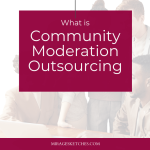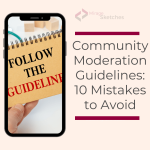Introduction
Community moderation is becoming an essential part of managing any online community, but many people may not know what that phrase means.
This post will explain “community moderation” in detail and provide information about the various community moderation services available.
What is meant by community moderation
Community moderation refers to managing and regulating online communities, typically on platforms such as social media, forums, or websites, by enforcing rules and guidelines set by the community or platform owner.
It involves the active monitoring and intervention of community members or designated moderators to ensure that the community remains safe, inclusive, and aligned with its intended purpose.
Community moderation aims to foster a positive environment by addressing inappropriate or harmful behavior, such as harassment, hate speech, spam, or other community guidelines violations.
Moderators are responsible for reviewing and, if necessary, taking action on reported content or user behavior, such as issuing warnings, imposing temporary or permanent bans, or deleting offensive content.
The role of community moderation may vary depending on the platform or the community’s specific rules and objectives.
Some communities have dedicated teams of moderators who oversee the community’s activities, while others rely on volunteer moderators or the collective efforts of community members to flag and report problematic content.
The goal is to balance maintaining order and promoting free expression, encouraging productive discussions, and minimizing disruptive or harmful behavior.
Community moderation often involves a combination of automated tools, such as content filtering algorithms or spam detection systems, and human judgment to make decisions in more nuanced or context-dependent situations.
Effective moderation practices prioritize transparency, fairness, and consistent enforcement of rules while respecting the rights and diversity of community members.
Benefits of Community Moderation
- Maintaining a Safe and Inclusive Environment: Community moderation helps ensure that online spaces remain safe and welcoming for all participants. By enforcing guidelines and addressing inappropriate behavior, moderators can prevent harassment, bullying, hate speech, and other harmful conduct, fostering an environment where users feel respected and protected.
- Promoting Productive Discussions: Moderation helps facilitate meaningful and constructive conversations by removing spam, irrelevant content, and disruptive individuals. By keeping discussions on topic and free from personal attacks or excessive negativity, moderators can encourage participants to engage in thoughtful exchanges and share valuable insights.
- Preserving Community Values and Purpose: Moderators play a vital role in upholding the values and purpose of the community. They ensure that discussions and activities align with the community’s objectives, preventing the spread of misinformation, propaganda, or content that may be inconsistent with the community’s mission.
- Mitigating Conflict and Resolving Disputes: Conflicts may arise within online communities. Moderators act as mediators, helping to de-escalate tensions, resolve disputes, and encourage constructive dialogue. They can step in and address conflicts, enforce rules, and guide users toward resolution, promoting a more harmonious and cooperative community environment.
- Enhancing User Experience: Effective moderation improves the overall user experience by maintaining a clean and organized community space. Users are more likely to engage and contribute when they feel their contributions are valued and the platform is well-maintained. Moderators can also provide assistance, answer questions, and offer guidance, enhancing the overall experience for community members.
- Building Trust and Credibility: A well-moderated community instills trust among its members. Users feel confident that the platform takes their safety and well-being seriously. This trust increases participation, loyalty, and a stronger community identity.
- Preventing Spam and Malicious Activities: Moderators actively monitor and filter out spam, scams, and other malicious activities that could harm community members. By implementing measures to detect and remove such content, moderators help protect users from potential threats and maintain the integrity of the community.
- Adaptability and Flexibility: Community moderation allows continuous adaptation and improvement based on evolving needs. Moderators can gather feedback from community members, adjust rules and guidelines as necessary, and implement new strategies to enhance the community’s functionality and user experience over time.
Types of Community Moderation Services
- Content Moderation involves reviewing and managing user-generated content to ensure it adheres to community guidelines and standards. Content moderators monitor posts, comments, images, videos, and other forms of content for inappropriate or harmful material, such as spam, hate speech, or explicit content. They may approve, edit, or remove content as necessary.
- User Behavior Moderation: User behavior moderation focuses on monitoring and addressing problematic behavior by community members. Moderators identify and respond to harassment, trolling, personal attacks, or other violations of community guidelines. They may issue warnings, temporary bans, or permanent bans depending on the severity of the behavior.
- Spam and Bot Moderation: Spam and bot moderation involves detecting and removing automated spam posts, fake accounts, and malicious activities. Moderators use various tools and techniques to identify and block spammy content and accounts that undermine the integrity of the community.
- Forum and Discussion Moderation: This type of moderation focuses on maintaining order and fostering productive discussions in forums, chat rooms, or discussion boards. Moderators ensure discussions stay on topic, remove off-topic or redundant posts, and encourage respectful and constructive dialogue among participants.
- Community Guidelines Development: Moderators may contribute to developing and refining community guidelines and policies. They collaborate with community managers and administrators to establish clear rules and expectations for community behavior. This involves analyzing user feedback, monitoring trends, and proposing updates to guidelines as needed.
- Crisis Management and Conflict Resolution: In times of crisis or escalated conflicts within a community, moderators play a crucial role in managing the situation. They provide timely responses, mediate disputes, de-escalate tensions, and guide users toward resolution or appropriate channels for support.
- Event and Livestream Moderation: Moderation services may be required for real-time events, webinars, or live streams. Moderators monitor chat interactions, respond to participant queries, remove inappropriate comments, and maintain a positive and engaging atmosphere during the event.
- Community Engagement and Support: Moderators often engage with community members, answer questions, provide guidance, and foster a sense of community. They may actively participate in discussions, organize community initiatives, and support users in navigating the platform.
- Reporting and Escalation Management: Moderators handle user reports and escalations, ensuring that reported content or behavior is promptly reviewed and appropriate actions are taken. They follow established processes to investigate reports and address issues effectively.
How to Choose the Right Community Moderation Service
- Understand Your Community’s Needs: Assess the specific requirements of your community. Consider factors such as the size of the community, the type of content being shared, the desired level of moderation, and any unique challenges or risks associated with your community. Identifying these needs will help you find a moderation service that aligns with your goals.
- Reputation and Experience: Look for a moderation service with a solid reputation and a track record of successfully moderating online communities. Research the service provider’s history, client testimonials, and case studies to gauge their expertise in handling various communities and challenges. Consider their experience in your industry or niche and their knowledge of relevant laws and regulations.
- Moderation Expertise: Assess the moderation team’s expertise and skillset. Consider their understanding of community dynamics, ability to handle sensitive topics and conflicts, and knowledge of different moderation techniques and tools. Ensure they have experience in content moderation, user behavior management, and crisis resolution, as these are critical aspects of effective community moderation.
- Flexibility and Scalability: Evaluate the service provider’s ability to adapt to your community’s changing needs. Consider their capacity to handle increased moderation demands as your community grows. Ensure they can provide additional resources or adjust their moderation strategies when necessary. A flexible service that can scale with your community’s requirements will save you from the hassle of switching providers in the future.
- Transparency and Communication: Choose a moderation service prioritizing transparency and open communication. They should provide clear guidelines on their moderation processes, response times, and escalation procedures. Ensure they are accessible and responsive, with ongoing communication and feedback channels. Transparent reporting and regular updates on moderation activities are essential for maintaining trust and staying informed about the state of your community.
- Compliance and Security: Data privacy and security are paramount in community moderation. Ensure the service provider has robust security measures to protect user data and sensitive information. They should adhere to relevant data protection regulations like GDPR or CCPA. Additionally, check if the moderation service has mechanisms to comply with legal requirements and appropriately handle illegal or harmful content situations.
- Customization and Integration: Consider whether the moderation service can be customized to fit your community’s unique needs. Look for a service that allows you to define and modify moderation guidelines, configure automated tools, and integrate with your existing community management systems or platforms. A tailored approach will ensure that moderation aligns with your community’s values and objectives.
- Cost and Budget: Evaluate the cost of the moderation service and ensure it fits within your budget. Compare pricing models, such as hourly rates, per-user fees, or subscription plans, and consider the level of service and value provided. Remember that quality moderation is an investment in your community’s long-term success and sustainability.
- Trial Period and Performance Evaluation: Consider opting for a trial period or pilot project to assess the effectiveness of the moderation service. During this period, closely monitor the performance of the moderation team, their responsiveness, and the impact on your community. Regularly evaluate their effectiveness against predefined metrics and KPIs to ensure they meet your expectations.
Conclusion
Community moderation is an important aspect of managing online communities and can help ensure the community’s safety and productivity.
Various community moderation services are available to help keep an online space healthy and engaging.
Researching and choosing the right service for the online space is important.





